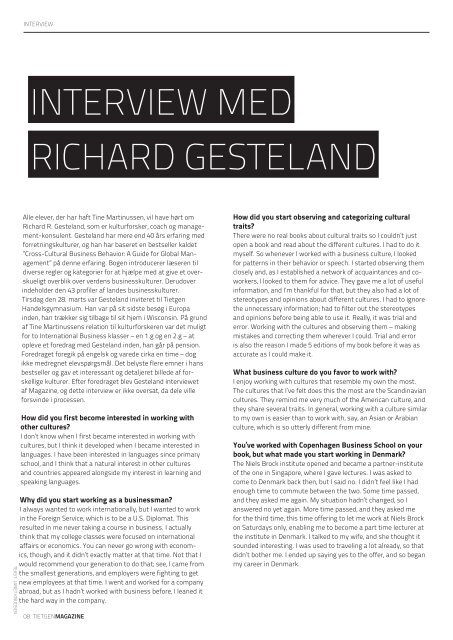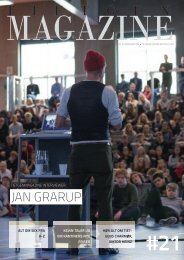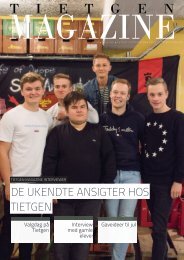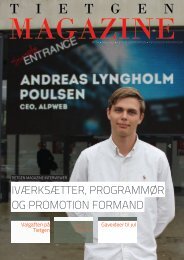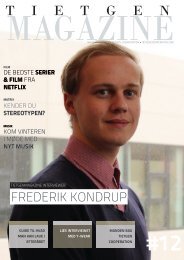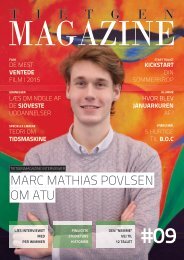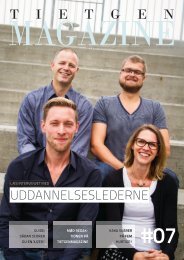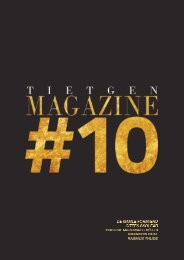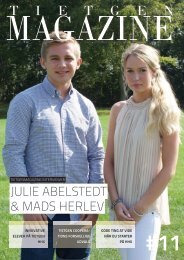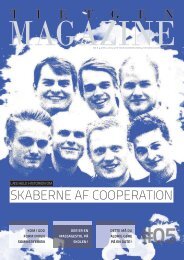Create successful ePaper yourself
Turn your PDF publications into a flip-book with our unique Google optimized e-Paper software.
INTERVIEW<br />
INTERVIEW MED<br />
RICHARD GESTELAND<br />
TEKST: JANET KNUDSEN<br />
Alle elever, der har haft Tine Martinussen, vil have hørt om<br />
Richard R. Gesteland, som er kulturforsker, coach og management-konsulent.<br />
Gesteland har mere end 40 års erfaring med<br />
forretningskulturer, og han har baseret en bestseller kaldet<br />
”Cross-Cultural Business Behavior: A Guide for Global Management”<br />
på denne erfaring. Bogen introducerer læseren til<br />
diverse regler og kategorier for at hjælpe med at give et overskueligt<br />
overblik over verdens businesskulturer. Derudover<br />
indeholder den 43 profiler af landes businesskulturer.<br />
Tirsdag den 28. marts var Gesteland inviteret til <strong>Tietgen</strong><br />
Handelsgymnasium. Han var på sit sidste besøg i Europa<br />
inden, han trækker sig tilbage til sit hjem i Wisconsin. På grund<br />
af Tine Martinussens relation til kulturforskeren var det muligt<br />
for to International Business klasser – en 1.g og en 2.g – at<br />
opleve et foredrag med Gesteland inden, han går på pension.<br />
Foredraget foregik på engelsk og varede cirka en time – dog<br />
ikke medregnet elevspørgsmål. Det belyste flere emner i hans<br />
bestseller og gav et interessant og detaljeret billede af forskellige<br />
kulturer. Efter foredraget blev Gesteland interviewet<br />
af <strong>Magazine</strong>, og dette interview er ikke oversat, da dele ville<br />
forsvinde i processen.<br />
How did you first become interested in working with<br />
other cultures?<br />
I don’t know when I first became interested in working with<br />
cultures, but I think it developed when I became interested in<br />
languages. I have been interested in languages since primary<br />
school, and I think that a natural interest in other cultures<br />
and countries appeared alongside my interest in learning and<br />
speaking languages.<br />
Why did you start working as a businessman?<br />
I always wanted to work internationally, but I wanted to work<br />
in the Foreign Service, which is to be a U.S. Diplomat. This<br />
resulted in me never taking a course in business. I actually<br />
think that my college classes were focused on international<br />
affairs or economics. You can never go wrong with economics,<br />
though, and it didn’t exactly matter at that time. Not that I<br />
would recommend your generation to do that; see, I came from<br />
the smallest generations, and employers were fighting to get<br />
new employees at that time. I went and worked for a company<br />
abroad, but as I hadn’t worked with business before, I leaned it<br />
the hard way in the company.<br />
08 TIETGENMAGAZINE<br />
How did you start observing and categorizing cultural<br />
traits?<br />
There were no real books about cultural traits so I couldn’t just<br />
open a book and read about the different cultures. I had to do it<br />
myself. So whenever I worked with a business culture, I looked<br />
for patterns in their behavior or speech. I started observing them<br />
closely and, as I established a network of acquaintances and coworkers,<br />
I looked to them for advice. They gave me a lot of useful<br />
information, and I’m thankful for that, but they also had a lot of<br />
stereotypes and opinions about different cultures. I had to ignore<br />
the unnecessary information; had to filter out the stereotypes<br />
and opinions before being able to use it. Really, it was trial and<br />
error. Working with the cultures and observing them – making<br />
mistakes and correcting them wherever I could. Trial and error<br />
is also the reason I made 5 editions of my book before it was as<br />
accurate as I could make it.<br />
What business culture do you favor to work with?<br />
I enjoy working with cultures that resemble my own the most.<br />
The cultures that I’ve felt does this the most are the Scandinavian<br />
cultures. They remind me very much of the American culture, and<br />
they share several traits. In general, working with a culture similar<br />
to my own is easier than to work with, say, an Asian or Arabian<br />
culture, which is so utterly different from mine.<br />
You’ve worked with Copenhagen Business School on your<br />
book, but what made you start working in Denmark?<br />
The Niels Brock institute opened and became a partner-institute<br />
of the one in Singapore, where I gave lectures. I was asked to<br />
come to Denmark back then, but I said no. I didn’t feel like I had<br />
enough time to commute between the two. Some time passed,<br />
and they asked me again. My situation hadn’t changed, so I<br />
answered no yet again. More time passed, and they asked me<br />
for the third time, this time offering to let me work at Niels Brock<br />
on Saturdays only, enabling me to become a part time lecturer at<br />
the institute in Denmark. I talked to my wife, and she thought it<br />
sounded interesting. I was used to traveling a lot already, so that<br />
didn’t bother me. I ended up saying yes to the offer, and so began<br />
my career in Denmark.


